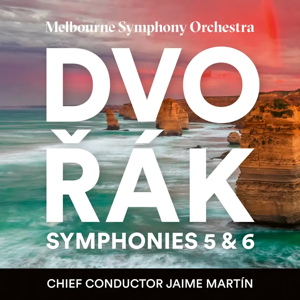
Antonín Dvořák (1841-1904)
Symphony No. 5 in F major, Op. 76
Symphony No. 6 in D major, Op. 60
Melbourne Symphony Orchestra/Jaime Martin
rec. 2023, Hamer Hall, Arts Centre, Melbourne, Australia
Melbourne Symphony Orchestra MSO0002 SACD [83]
This is the first release in a projected, five-disc, Dvořák symphonic cycle by the Melbourne SO under their Chief Conductor Jaime Martin on their own label.
Knowing that the conductor was born in Spain and now lives in London, I was slightly nonplussed by the his opening statement in the notes declaring his love for the music: “The nostalgia that his music provides for one’s home country has accompanied me since I first heard my father’s LP of the New World Symphony…” – but I guess he means that he in general empathises with Dvořák’s yearning for his homeland of Bohemia, which is expressed by his borrowing of folk melodies, rather than the conductor himself actually hankering after the composer’s native land.
Despite their relative brevity and compactness – actually something of a welcome change of scenery if, like your reviewer, you have been listening to a lot of Bruckner of late – these are the first of Dvořák’s symphonies to express his symphonic gift in its full maturity. I have long had a special affection for the lilting opening of No. 6 and indeed for the symphony as a whole. There is, however, no shortage of fine recordings available, and in the unforgiving sphere of music criticism this new recording must stand comparison with such distinguished exponents as Kertész/LSO, Neumann/CPO and Suitner/Staatskapelle Berlin.
Cheerful and entertaining as the Fifth Symphony is, the Sixth represents and advance in Dvořák’s craft and I began preparing for this my review by comparing all those aforementioned recordings of that favourite opening. They are very alike with the exception of Suitner who draws stronger dynamic and phrasal contrasts between the gentle, rocking introduction and the dynamic development – and as a result, his interpretation is more striking and characterful than any of the other three. Not that any of the others are bad – far from it – but the Suitner is special.
Nonetheless, this a thoroughly enjoyable account, lilting, occasionally mysterious and benefitting from Martin’s flexible beat, bringing our rhythmic nuance. I love the way he builds tension for the recapitulation then pulls back on the beat before re-launching fortissimo; his conducting is thoughtful and logical in its calculated effect without being self-regarding. He makes the most of the faux-serene ending before the uncompromisingly loud restatement of the second theme.
The beautiful woodwind playing in opening of the Adagio really sings before the passionate love theme is tossed back and forth in various forms from section to section; the horns, too, are especially smooth and seamless, reinforcing the atmosphere of an amorous Nocturne. The Scherzo furiant is lithe and very well played, the relaxed, dreamy Trio contrasting neatly with the frenetic outer sections. The finale is driven and exciting, its kinship with Brahms’ Second Symphony and, to my ears, the Academic Festival Overture, very obvious; the upper strings really come into their own here although they occasionally produce a slightly edgy, shrieky tone when I would welcome a warmer, more homogeneous sound. The fugue of the coda is thrillingly executed at high speed; the ending could hardly be more rousing.
The opening to the jolly first movement of No. 5 is gentle and bucolic before moving energetically into the stomping, romping dance music; Martin phrases affectionately and the orchestral playing is lovely, with once more some especially mellow woodwind playing. Momentum is maintained throughout and the weight of sound is again reminiscent of Brahms at his most congenial. The cellos savour the sombre, dignified main theme of the slow movement which is seemingly endlessly variegated almost like an idée fixe; yet again, the woodwind shine in the lighter middle section which momentarily shakes off the solemn main theme but that soon creeps back in and supposedly concludes – only for us to hear the tune repeated in the opening of the Scherzo, which is Dvořák’s little joke, as a skipping, then boisterous, tune soon takes over. Even the thunderous finale cannot quite shake off that tune, of which an emphatic variation forms its main burden. After a couple of deceptively slow, yearning – but brief – interludes, the horn summons us to battle and we set off pell-mell towards a typically exuberant, pounding climax. I realise I am here providing more of a “narrative commentary” than critiquing the performance of the artists, but that is because they are doing just what is required to deliver the music as I imagine the composer intended it to be.
The sound is first-class as one might expect. This is an SACD but I listened in conventional stereo sound and was very satisfied. The success of this recording makes me look forward to the next four releases.
Ralph Moore
Buying this recording via a link below generates revenue for MWI, which helps the site remain free.



















